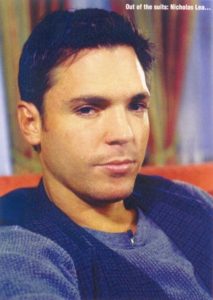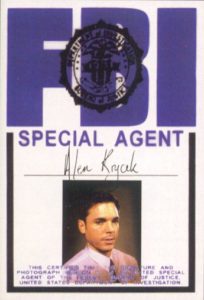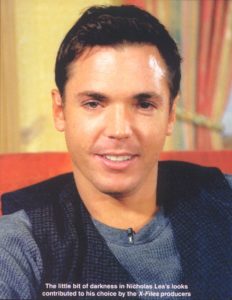January 1996
Starburst #209
The X-Men
Interview by Joe Nazzaro. Photo by Stephen Payne.
As the third season of The X-Files continues to unfold, the series has produced a number of intriguing supporting characters who are slowly starting to achieve cult status of their own.
That list includes FBI Assistant Director Skinner (played by Mitch Pileggi), and agent-turned-assassin Alex Krycek (Nicholas Lea), both of whom take on different roles following the events of last season’s cliffhanger, Anasazi.
Nicholas Lea originally appeared in the first season of The X-Files playing one of the victims in “Genderbender,” but it was the role of Agent Krycek, a temporary partner of Mulder’s who turns out to be a plant by the mysterious Cigarette Smoking Man, that earned him a permanent place in X-Files history.
The Bad Stuff
“When I went in to read for it, they didn’t really tell me anything,” remembers Lea. “I just knew this guy was living a double life, and was hedging more on the side of bad than good. That was a really fun thing to be able to do, to be this good guy on the surface, but try in small ways to let the bad stuff come out through the pores a little bit.
“The way I understand it, he’s one of those characters that people love to hate, and why that happens, I’m not really sure. He’s also a contemporary of Mulder’s, and the same age, and it’s somebody who can give him some problems other than the Cigarette Smoking Man, who just delegates power. This guy, if nothing else, is a physical threat, as you’ll be seeing in some of the shows that are coming up.”
Mitch Pileggi first appeared as Assistant Director Skinner in the first season’s “Tooms,” but returned the following year for a further nine episodes. Early episodes didn’t reveal much about the character, but Pileggi says each script continues to peel away another layer of Skinner’s life.
‘Until “One Breath,” I didn’t know that he was an ex-marine,” says Pileggi. “They may have come up with that because of the way I was playing the character, but I talked to Jim Wong, who along with Glen Morgan created the character, and he had told me that Skinner was pretty much somebody who at one time had been in the same place as Mulder is. He was a field special agent, and worked his way up through the ranks, and now he’s in the position he’s in now, which is a bureaucratic situation.
“A big aspect of the character is the atmosphere that I work in. You walk into that office and you get such a feeling of power, so as soon as I put that suit on, and my glasses, and walk into that office, it’s like the character is there. That set is so important to the development, sitting behind that desk, and what I’ve got on the desk, the pictures on the wall, the flag; that whole feeling is very important.”
A Regular Guy
Pileggi says when he first appeared as Skinner in the first season, he had no idea The X-Files would turn out to be a regular gig. “It’s hard to predict what’s going to happen in this business, so I don’t think it’s very smart to try to plan or anticipate anything. You just have to go along with the flow, and that’s what I did. Fortunately, Chris [Carter] likes the character and it’s been working.”
‘I originally thought it was just going to be the three,” says Lea, of his initial outing as Krycek. ‘Originally they had written a different ending, where the three of us, Mitch, David and I have a real confrontation, and then in the final draft, which was really disappointing to me, it just kind of vaporized. You didn’t know what happened to him, and I was really let down by that, because I wanted to have some resolution; not knowing of course that they had plans to bring the character back. From what I understand, they were happy enough with him to decide to continue, and that was good to know.”
If many of the characters in The X-Files seem well-cloaked in secrecy, either with a mysterious past, or an equally enigmatic agenda, the actors say they don’t know much more than the viewers in that regard. In Lea’s case, he has no idea what the full story behind Krycek actually is. “The way I understand it, Chris has a really long overview of the show, but it’s also unfolding as they’re doing it. They’re reacting a little bit to the public, because they want to keep people happy, but at the same time, they really stick to their original vision of whatever that’s going to be for them. They don’t really say, ‘Okay, next year you’re going to be doing this or that’. It pretty much tends to happen as it goes.”
“I know nothing!” laughs Pileggi about Skinner’s long-term character arc. “They don’t sit down and tell me in each episode, ‘This is what’s going on with this guy’. I just try to figure it out, because so much of it is in the writing that it’s pretty clear to me what they want.”
Quizzed about some of the high points of working on The X-Files, Lea says there are plenty, including the opportunity to go out and meet fans of the series. “I honestly feel really grateful to be on the show. I’ve eaten a lot of macaroni and cheese in my life, and so when the time comes for you to do a job, you just hope that it’s going to be a good time, and so I really feel lucky to be on a quality show.
“It’s also done a lot for my fledgling career, because I’ll go into rooms in Los Angeles with big producers and they’ll say, ‘Hey, X-Files!’ You can’t buy that, so I’ve got to tell you, every aspect of my experience so far has been nothing but good.”
Like Lea, Pileggi says working on a high-profile series like The X-Files has definitely increased his visibility. “As far as casting directors, it’s been very good for me, because it’s a great character for them to see me playing. There are a lot of people who watch this show. David Duchovny was talking to Spielberg and he said that Spielberg certainly watches the show every week. Barry Levinson watches the show constantly. David also met Stephen King recently, and he wants to write an episode. Thexv’s a lot of people who want to get involved in it. Tarantino wants to direct an episode, which would be pretty wild. I think the audience we have for this show is extremely intelligent.”
Away from the Files
Apart from their work on The X-Files, both actors have other genre projects in the offing. Lea will be shooting at least one episode for the next season of Sliders. His character was swept along with the four travellers in last season’s cliff-hanger, but whether he’ll be joining them for further adventures remains to be seen. “I haven’t read that script, so I don’t know what they have planned. There’s definitely a response to the audience to bring me back, anyway.”
Meanwhile, Pileggi has a cameo in Eddie Murphy’s new horror/comedy, A Vampire In Brooklyn, directed by Wes Craven, with whom Pileggi worked on the 1989 film Shocker.
“Wes asked me if I would play this role, which is just one scene, but it introduces Murphy’s character into the movie, and it was a lot of fun.”
As for their respective work on future X-Files, both actors aren’t saying much just yet. “I do some crazy and fun stuff; a little espionage,” says Lea, a major understatement, considering Krycek’s involvement with a certain DAT tape in the opening episodes of season three. “In general terms, the relationship becomes a lot more personal between myself, the two main characters and Mitch, and it gets a lot more exciting for my character.”
Pileggi admits signing a contract for a certain number of episodes for the third season. “Whether I appear in all of them or not is really up to Chris. There will still be periods when Skinner isn’t around. It’s hard, because when they’re out in the field, you can’t have Skinner there. I think when he’s on the show from now on, it’s going to be a prominent role, not just a scene here and there.”
Another understatement, as the relationship between Skinner and his agents moves into a whole new level of intrigue and conspiracy in season three. “I hope they can work in more of those situations so he does get out more often,” agrees Pileggi, and then jokes, ‘but I do like that office!”


